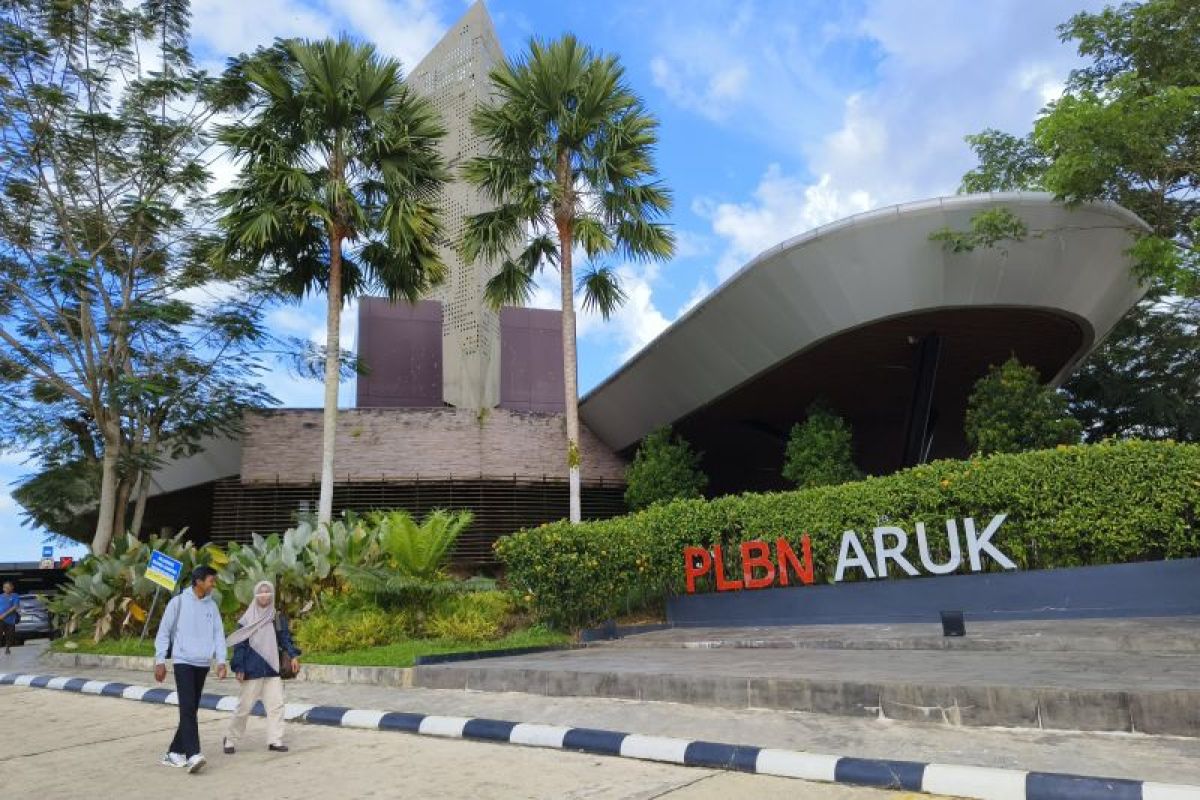The PLBNs facilitate the crossing of people and goods between Indonesia and Malaysia, increasing trade values between the province and its neighboring foreign region, Sarawak.
The Indonesian government has invested heavily in infrastructure and facilities, including markets, schools, and service offices, surrounding the posts: PLBN Entikong in Sanggau, PLBN Aruk in Sambas, and PLBN Badau in Kapuas Hulu.
Additionally, all PLBN buildings have modern designs that show the beauty of local cultures, making them attractive to foreign visitors.
Data from the West Kalimantan Office of Statistics Indonesia showed that the number of foreign visitors coming into the province through the three PLBNs in the January-November 2023 period reached 63,782, around 73.5 percent of which, or 46,882 visitors, came from Malaysia.
In the same period, 29,825 foreign visitors crossed PLBN Entikong, while 25,416 and 8,540 people crossed PLBN Aruk and PLBN Badau, respectively.
The inflow of foreign visitors has helped local people develop their tourism businesses, such as hotels, restaurants, transport, and attractions.
The government has been investing significant efforts to make all PLBNs all over the country reliable facilities by arranging the environment, improving services, and enhancing the quality of human resources employed.
In addition to accommodating the crossing of people between Indonesia and Malaysia, PLBNs in West Kalimantan serve as facilities that monitor the flow of agricultural commodities between the two countries.
The total export value from West Kalimantan to Malaysia through the three cross-border posts was recorded at US$434.84 million in the January-November 2023 period, an increase of 40.1 percent from US$301.87 million in the same period of the previous year.
The province’s main exported commodities to Malaysia are pepper, coconut powder, durian, langsat, fish, squid, and jellyfish.
The PLBNs also brought a blessing for local entrepreneurs. Edy, an agricultural produce trader, admitted to being facilitated by PLBN Aruk to make exports at lower fees, boosting the competitiveness of his products.
He also said that the existence of the PLBN had led to an increase in demand for his products owing to the convenient and swift services offered at the post.
Government Commitment to Border Development
Highlighting the government’s commitment to border regions, Home Affairs Minister Tito Karnavian, also chair of the Border Management Agency (BNPP), visited West Kalimantan to inspect preparations for the inauguration of PLBN Jagoi Babang in Bengkayang on December 13 last year.
He said that it is crucial for the government to ensure security in every inch of the country to safeguard its sovereignty, including in border regions.
By constructing PLBNs, the government aims to conduct tight supervision on Indonesia’s land borders, detecting and dealing with illegal transport routes, domestically known as “jalur tikus” (rat paths).
Since 2015, the government has been building 18 new PLBNs in various border regions, 13 of them have been completed. Of the 13 newly built PLBNs, eight have been operational, while the rest are awaiting inauguration.
PLBN Entikong in West Kalimantan’s Sanggau has been standing as the oldest of its kind in Indonesia. The operation of the PLBN dates back to October 1, 1989. In December 2016, President Joko Widodo reofficiated the PLBN following its revitalization.
Two other PLBNs in the province were inaugurated in March 2017, while construction is complete for the fourth one—PLBN Jagoi Babang—and currently waiting to be officiated.
The West Kalimantan government, for its part, has taken concrete measures to make the most of the PLBNs as instruments for bringing economic benefits to local residents. The measures include ramping up exports through PLBNs.
West Kalimantan Acting Governor, Harisson, stated that the operations of PLBNs have indeed been making it more convenient to transport people and goods to and from border regions.
The cross-border posts are expected to continue to contribute significantly to the economic growth of West Kalimantan, he said. It is vital for the province to make tenacious efforts to utilize the posts by promoting its featured products in international markets.
The operation of PLBNs in the province is also supported by the Indonesian Consulate General in Kuching, Sarawak, Malaysia, by organizing business-matching activities and exhibitions to display local products from West Kalimantan and Kuching.
Firdaus, a scholar from the University of Tanjungpura in West Kalimantan’s capital of Pontianak, observed that the presence of PLBNs had brought significant improvements to people in border regions, both economically and socially.
His research showed that the living conditions currently are much better as compared to those prior to the existence of the posts, especially of PLBN Aruk.
Bearing all that in mind, it is safe to say that the central and regional governments need to continue to pay close attention to the potential, opportunities, and challenges found in border regions.
In order to affirm Indonesia’s sovereignty in its border areas, the governments should ensure proper development in the social, economic, and educational aspects. It is only then that the PLBNs will become the pride and sources of wealth for the people.
Related news: PLBN development becomes border areas’ foundation of economic growth
Related news: Papua urges use of rupiah in Indonesia-PNG border region
Translator: Dedi, Tegar Nurfitra
Editor: Anton Santoso
Copyright © ANTARA 2024
